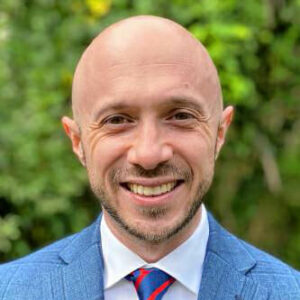
By Chet Jordan, Ph.D.
Dean of Social Sciences and Professional Studies, Greenfield Community College
We often neglect silence. In our quest to preserve and uplift success, we shy away from what isn’t there, from who and what was left behind, and from the stories that got lost along the way. It is beautiful to celebrate the grit, determination, and ability of those who cross the finish line but there is kaleidoscopic complexity in each individual who never comes into the camera’s view.
One of the largest subgroups in the American higher education system is comprised of transfer students. Although students transfer in various directions throughout the system, a vast majority attempt to transfer from community colleges to four-year institutions. Recent data show that 31% of students who first enroll at a community college transfer to a four-year college within six years (Shapiro et al., 2019). Astonishingly, close to 80% of community college students hope to earn a bachelor’s degree, yet 60% who enroll in a community college with the hope of transferring to a four-year institution fail to do so.
..by mapping everything out early and tracking my steps, my priorities were clear; I knew what to say yes to, and what I had to say no to because it was not in alignment with my goals.
With these numbers in the foreground, it becomes imperative to interrogate the silence. The reasons why community college students struggle to achieve baccalaureate attainment represent a crisis in our collegiate system. This fact is underscored when institutional policies—which we as administrators and faculty members impose and create—are revealed to be the primary barriers to student success.
As one of the nation’s largest urban university systems, the City University of New York (CUNY) is a leader in community college reform. Transfer remains one of the most significant policy challenges for CUNY and is a critical area of research. Under the direction of former CUNY Executive Vice-Chancellor and University Provost Alexandra W. Logue, a team of scholars was assembled in 2018 to identify the “leaky pipeline” of transfer. Dr. Logue and her team were awarded several high-profile grants to determine where current polices negatively and disproportionately impact transfer students. The discussion that follows identifies key areas of policy reform and, in closing, offers practical steps institutions can take to make strides toward more equitable transfer pathways.[wcm_restrict]
Developmental Education
Community colleges have, historically, served as access points into the postsecondary system for individuals who are disproportionately marginalized by the meritocratic four-year system. Standardized testing, strict admissions standards, and lofty price tags are prohibitive factors for many of the nation’s low-income, BIPOC students. In turn, this represents a large percentage of students who have been characteristically underserved by the nation’s public school system, often arriving at college from under-resourced secondary schools with high teacher turnover and little in the way of college preparatory support. Before they cross the threshold of their chosen community college, upwards of 60% of students nationally are assessed as needing basic skills remediation. Traditionally, these courses have been offered for no college credit, requiring a student to invest valuable financial aid awards and substantial time into classes that do not count toward a degree. Most drop out along the way, or, in some cases, before they ever enroll. Developmental education is one of the most significant barriers to community college transfer and represents a critical opportunity for wholesale reform.
References
Ebony, By, and O. McGee. “Reimagining Critical Race Theory in Education.” Harvard Journal of African American Public Policy, p. 44.
Hecht, Ben. “Moving Beyond Diversity Toward Racial Equity.” Harvard Business Review. 16 June 2020.
House, Jeremy. “How Faculty of Color Hurt Their Careers Helping Universities with Diversity.” Diverse Issues in Higher Education. 27 November 2017.
Kohn, Margaret. “Public goods and social justice.” Perspectives on Politics, vol 18, no. 4, 2020, pp. 1104-1117.
Sólorzano, Daniel G., Octavio Villalpando, and Leticia Oseguera. “Educational inequities and Latina/o undergraduate students in the United States: A critical race analysis of their educational progress.” Journal of Hispanic higher education, vol. 4, no. 3, 2005, pp. 272-294.
Thelin, John R. A history of American higher education. JHU Press, 2011.
Tilak, Jandhyala BG. Higher Education, Public Good and Markets. Taylor & Francis, 2017.
 Chet Jordan, Ph.D.
Chet Jordan, Ph.D.
Dean of Social Sciences and Professional Studies, Greenfield Community College. Chet Jordan is a higher education researcher, professor, and administrator. His scholarship focuses on community college reform including developmental education, guided pathways, and transfer. Dr. Jordan is author and co-author of several books related to higher education policy and practice. [/wcm_restrict] CTA

